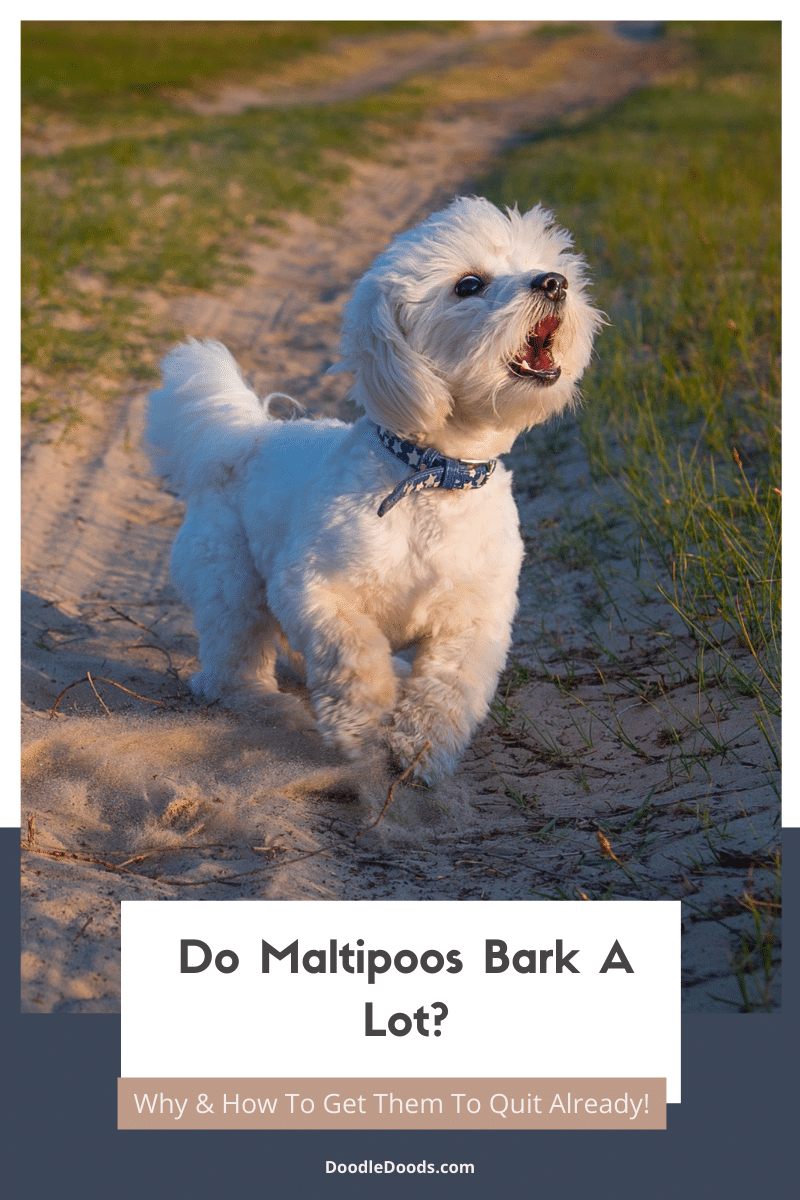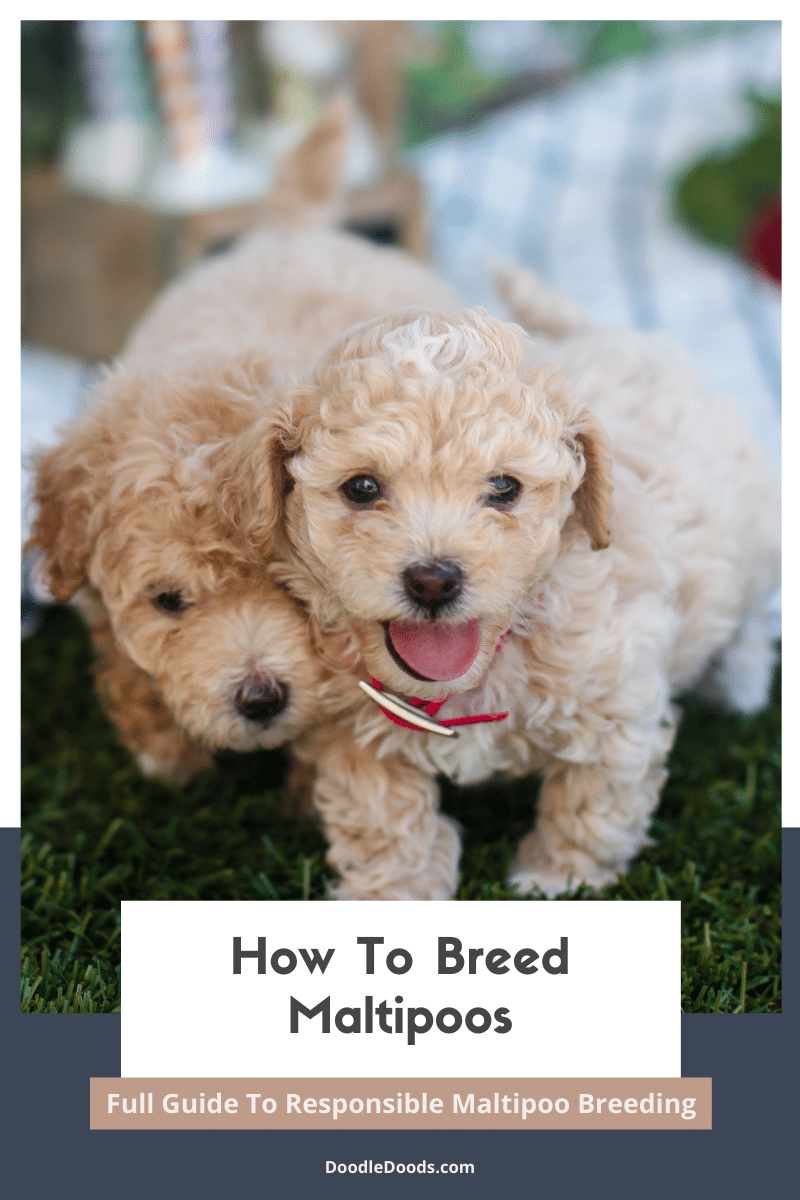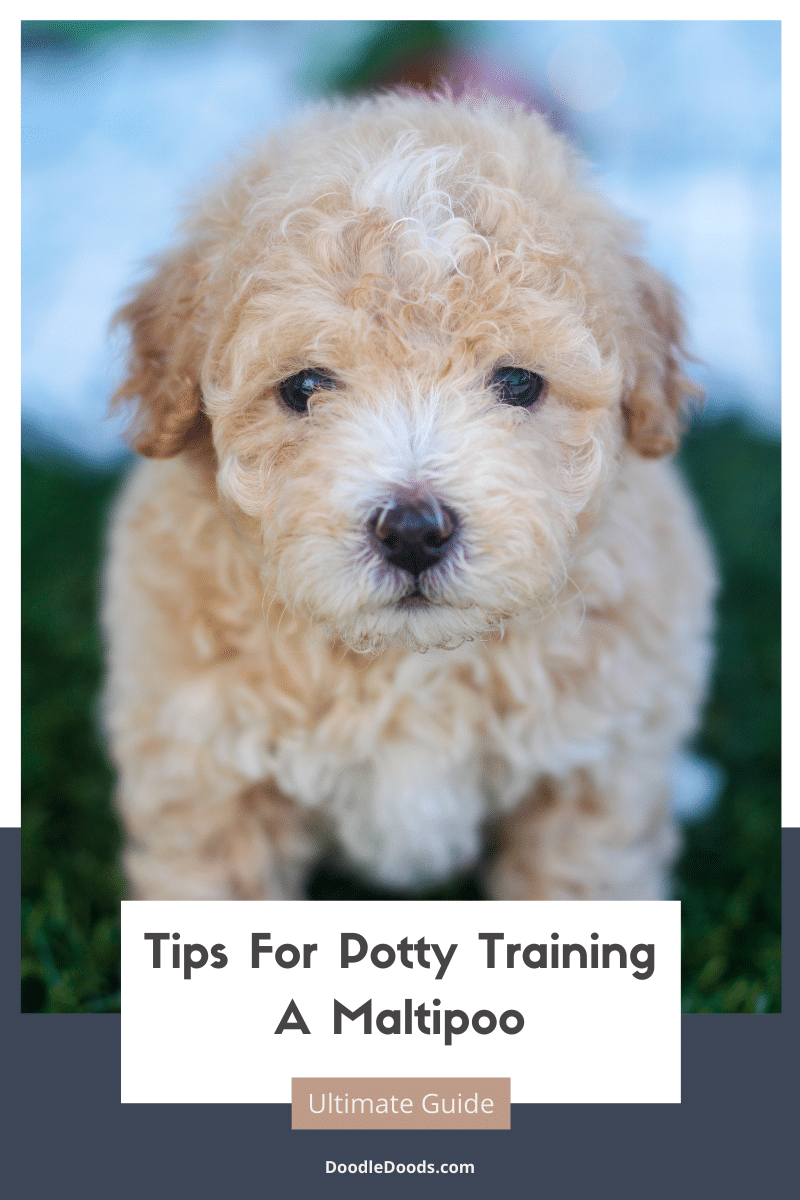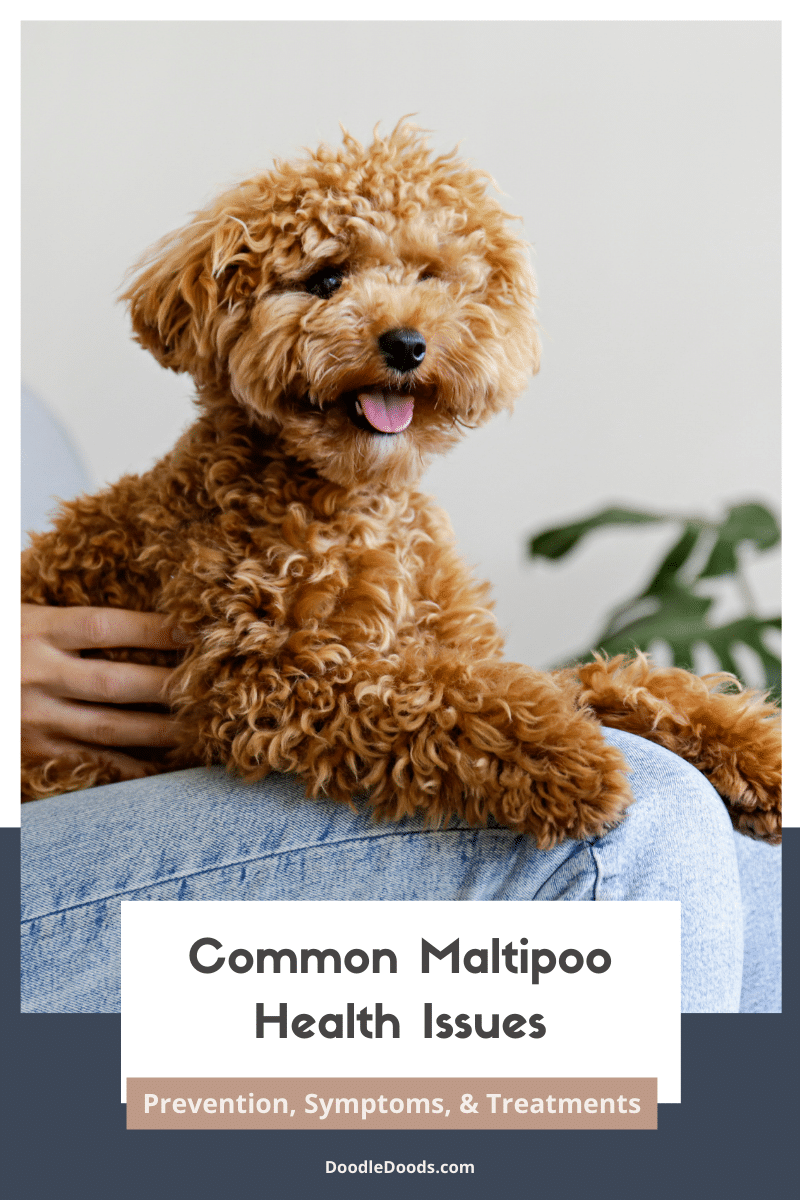Maltipoos, a teddy-bear-like cross between a Maltese and either a Mini or Toy Poodle, are great little family dogs. They really do have everything you could want in a pet. They are fun, have plenty of energy for games in the park, love snuggling with their favorite humans, and look utterly adorable doing all of that. If you are reading this, you have likely either recently adopted one of these dogs or are thinking about doing so. But…do Maltipoos bark a lot?
Through first-hand experience or hearsay, the issue of barking and other unwanted behaviors might have arisen. This is definitely something to think about when taking on a new pet. After all, you need to take the bad with the good. Luckily, in most cases, such problems are easily resolved. Here we’ll dive deep specifically into barking, taking a look at whether Malitpoos tend to be excessive barkers and, if so, what you can do about it.
Table of Contents
- Do Maltipoos Bark A Lot?
- Why Maltipoos Bark
- Training Your Maltipoo Not To Bark
- What To Do When Your Maltipoo Barks At Night
- Do Maltipoos Bark A Lot: Frequently Asked Questions
- Do Maltipoos Bark A Lot: Conclusion
Do Maltipoos Bark A Lot?
If you’ve spent any time at all around dogs (which we assume as a dog lover, you definitely have), then you’ll already know that the smaller they are, the louder they tend to be. While more giant breeds seem pretty chill and relaxed about life and everything it throws at them, littler ones seem to have an awful lot to say about, well, just about everything! Even so, many newbie pet parents are surprised when their darling ball of fluff doesn’t always act as sweet as their cute good looks would indicate!
When it comes to the Maltipoo, you have two smaller breeds in the mix. But what does this indicate about how noisy they might be? Well, Poodles are thought to be pretty chatty dogs – especially the Mini and Toy varieties. The Maltese, on the other hand, teeny yet highly energetic, has quite the reputation as a particularly enthusiastic barker. All this adds up to the undeniable fact that your Maltipoo is genetically prone to more excessive vocalizations than other dogs. Luckily, though, this is not something you simply have to learn to live with.
Why Maltipoos Bark
So what is it about smaller dogs that makes them much yappier than their larger cousins anyway? Well, logic would dictate that their diminutive size makes them much more vulnerable than other canines. As noise has always been a vital way that animals make themselves seem much more ferocious than appearances would suggest, chances are that this is what lies behind at least some of the barking behavior. However, their actions at the time will often suggest there likely is a little bit more to it than just that:
They Are Excited
One time you might expect and tolerate your pup barking is when they are feeling particularly happy about something. Whether it be heading out for a walk or bounding around the park with their pals, these kinds of vocalizations are only natural. However, excited barking can become a problem when the location doesn’t suit it. For instance, your hound may let up a cacophony whenever someone calls around at the house. This is the kind of barking you will want to train them out of just as soon as you can.
To Get Your Attention
With the amount your pup no doubt adores you, it’s only natural that they do everything they can to get your attention. Dogs love rewards and do all that they can to get them – whether in food form or affection from their family. Likely, your pal learned early on that barking is an excellent way for them to get noticed. While this is true of all dogs, often larger ones are ushered out of the house. An unfavorable outcome from the behavior makes it less likely to persist. Little dogs are less likely to be handled in this way.
They Are Feeling Anxious
Barking in all dogs is often a symptom of simply not being comfortable with their current surroundings. If you think about it, barking, especially when accompanied by growling and teeth showing, tends to make people and other dogs back off a bit. This is great for your pooch if they were feeling intimidated – they made the problem go away! Again, as their actions were rewarded, they will repeat them each time they are placed in a similar situation. This is likely to be a far more common response in small dogs.
To Ward Off Boredom
Most Maltipoos don’t relish being left home for endless hours at a time. Therefore barking behavior when they are alone is often a sign your dog is dealing with a pretty major case of separation anxiety. Alternatively, it might simply be the case that they aren’t getting quite as much mental stimulation as they would like. Doodles of all kinds are highly intelligent dogs who need to have things to do. While you obviously can’t spend all your time entertaining your pup, dog toys are often a good shout.
It’s A Guarding Behavior
Dogs can be pretty territorial critters, and usually, one of the biggest causes of your dog barking at everyone who comes near their house is guarding. They are protecting their resources and everything else they view as theirs. Again, this is largely a fear-based barking response. Your pal is worried that the approaching stranger is going to take something away from them. However, some breeds might also be asserting their dominance over others in this way – warning them off their turf, so to speak.
There Are Loud Noises
If you’ve ever had to retrieve your cowering, shaking pet from under the bed where they are alternating whines with barks, then you’ll know just why fireworks are the bane of any dog owner’s existence. Pups are likely to be far more noise reactive than us due, in part, to their superior hearing – imagine what fireworks sound like to them! So you’ve got that, coupled with the fact that your pooch has no idea what these loud noises are, where they are coming from, or when they will end, and it’s only understandable that they act out.
Training Your Maltipoo Not To Bark
So by now, you have a few insights into common reasons Malitpoo’s bark. With this information, you may have uncovered the underlying reason why your pup is exhibiting this annoying behavior. That’s the all-important first step in fixing it. So now you can try one or more of the following to address the issue.
Avoid Giving Them Attention
As touched on above, barking is something that can be inadvertently reinforced in smaller dogs as compared with their larger counterparts. The reason for this is while with larger mutts, it may lead to adverse outcomes such as them being separated from their family, people tend to baby smaller, cuter pups, and so they are more likely to get affection. Change this behavior in yourself by not gifting unwanted behaviors with any kind of attention (this includes shouting, as to many dogs, any attention is good attention – plus they might think of it as a game), and you’ll be able to (gradually) alter it in your pet too.
Rotate Their Toys
If you believe that boredom may be the culprit for your four-legged friend’s frequent vocalizations, it’s good to find ways to keep them entertained. While you might wish you could spend more time playing with your precious pet but struggle to find that time, there are other ways to do this. Luckily, there are a wide array of engaging canine toys that can take some of the pressure off. Puzzle toys especially are favored by the clever Doodle. These can be used to keep them busy, especially if you provide only limited access to each of them, therefore, making them that much more exciting to your dog.
Ensure They Get Enough Exercise
When correcting excessive barking, it’s good to consider all the possible reasons behind it. While it’s easiest to blame the dog (after all, they are the ones doing all that annoying barking), it’s also useful to consider our role in the behavior. Maltipoos, despite being teeny pups, have an incredible amount of energy. For this reason, they likely need a little more exercise than you might think. If you have taken one of these Doods on as an apartment pet, you may need to take them out more often or for longer walks than you currently do to burn off all that excess energy.
Give Them Their Own Safe Space
As fear response so often lies behind problematic barking, you’ll want to do everything in your power to help your pooch feel safe in their own home. Part of this is providing them with their own dedicated space that they can access whenever they want and be alone there. Make sure to set this up in a quiet area of the house – but not too far removed from everything else. Here you can put their crate or bed, a water bowl, and some of your pup’s favorite toys. Having a separate “doggy area” is especially important in homes with small children. Remind your kids not to disturb the dog while he/she is in this space.
Take Them To See The Vet
While there are multiple behavioral causes for barking, another possible reason you may not have considered is that there might be something physically wrong with your pet. Dogs that are either sick or in pain may bark to communicate their distress. If you suspect this might be the case – because your otherwise reasonably quiet pooch has suddenly started barking excessively or due to other telling signs, such as them flinching away when you go to touch them, having issues with eating, sleeping, or toileting, or noticing a more general change in behavior then it’s time to get them checked out by the vet.
What To Do When Your Maltipoo Barks At Night
Night-time barking is especially problematic. Not only can it keep you from getting a decent night’s sleep, but it could also very well do the same for your neighbors. This is unlikely to win you any neighborhood popularity contests. Worse, they may even report you to the relevant authorities if the issue persists. Happily, there are a few things you can do to ensure that this doesn’t become something that you need to deal with.
Take Them For A Pre-Bedtime Walk
Again that excess energy of Maltipoos could easily be to blame for them waking you in the wee hours. That’s why it could be a good idea to take them for one final trip around the block before settling them down for the night. If you’re not keen on walking around at night or just can’t find the time, leave them in the yard for a while if they seem content enough to find their own fun. A Kong Toy with its fun erratic bounce can help with this.
Set Up A Quiet Space For Them To Sleep
If your Malti is particularly bothered by noise, whether because of their house-guarding tendencies or due to them being on the sensitive side, then it’s a good idea to set them up to sleep in the quietest part of the house – close to you, if possible so that they can feel comforted by the presence of their family. Avoid allowing them access to windows where they can keep watch and alert you by barking to the sight of every passerby.
Keep Everything They Need By Their Bed
Again, boredom can become a factor if you’re cooping your pet up for long overnight hours in a crate or designated sleep area. To prevent them from barking up to you for a bit of love and attention because they are feeling particularly bored, keep some of their toys around that they can enjoy while they’re waiting for the rest of the family to wake up. Your pup should also have access to water, and a little kibble or treat wouldn’t be bad, either.
Do Maltipoos Bark A Lot: Frequently Asked Questions
Both parent breeds of the lovely Maltipoo are known barkers, which makes it highly likely that this could be a problem with your pup too. However, if you’re keen to adopt one of these dogs, you shouldn’t let this deter you. The truth is that every type of dog has their unique challenges; the trick is to know the best way to overcome them well in advance.
Doodles of all kinds are intelligent pups. As such, they are reasonably easy to train. So, in that respect, you can teach Maltipoos not to bark… to excess. However, it won’t be quite the same as training them to sit. The fact is, these dogs enjoy barking, and they’re good at it, so you should be aiming to reduce rather than completely eliminate this behavior.
Dogs tend to be more vocal if their ancestors were bred for it. For instance, many types of working dogs were prompted to alert their owners to various things – these, in modern generations, tend to be the barkers of the pack. Pups made to race, such as Whippets and Greyhounds, or deal with livestock like Shepherds, tend to be far quieter.
Barking, while in part communicative, is reinforced by how their owner responds to it. So, if you give your dog attention – any kind of attention, then they will likely carry on with this behavior. However, if your pup receives a negative outcome for barking (think withdrawing of attention rather than shouting or hitting), they will be less likely to continue.
Like pretty much all dogs, Maltipoos tend to be much more excitable in their younger years. So, chances are excessive barking will calm down as they get older (as long as it isn’t reinforced in any way during that period). Always be aware of your response to both desirable and undesirable behavior – aiming to reinforce the former and reduce the latter.
Do Maltipoos Bark A Lot: Conclusion
Maltipoos, like many other small and toy breeds of dogs, are susceptible to vocalizations and especially to yappiness. While this is understandable and tolerable in certain situations, in various others (such as at night), it’s absolutely not, and you need to find ways to communicate this to your pup. Setting your dog up for success with environmental factors like placing their bed in a quiet area of the house can really help reduce emotion-based barking. For everything else, you’ll need to do some training.
Hopefully, this article has provided some useful information on Maltipoos if you are thinking of adopting one or some inspiration for dealing with problematic barking if that’s the head scratching issue you’re currently experiencing with your beloved pet.
Learn How to Care for Your Doodle Puppy!

Perfect for first-time Doodle parents, get ALL your questions answered, including questions new Doodle parents don’t even think to ask.
Plus, get $700 worth of Bonus Materials for FREE, including:- Doodle Parenthood Community and Support Group ($190 value)
- Doodle Puppy Growth Tracker ($20 value)
- EMERGENCY Cheatsheet: When To Call The Vet Immediately ($50 value)
- HELP! Button ($145 value)
- And SO MUCH MORE!










